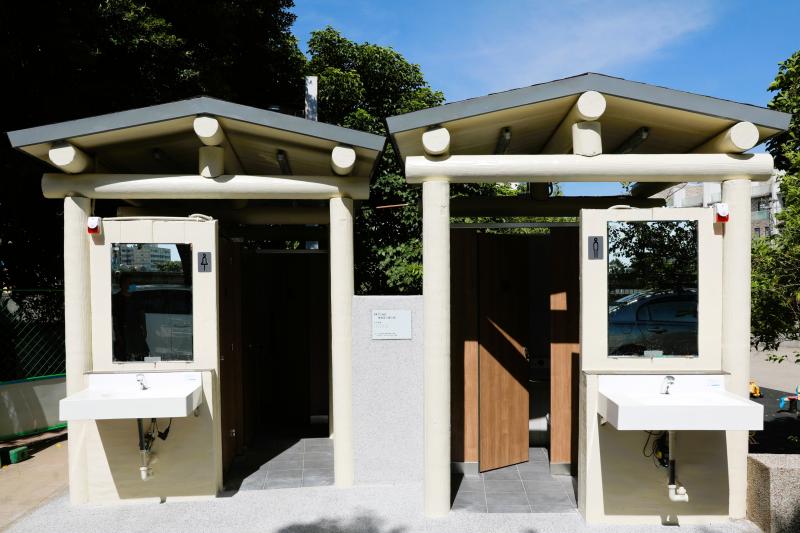Although the Environmental Protection Administration (EPA) has been telling people to flush toilet paper in toilets since 2017, roughly 55 percent of respondents to a survey still dispose of it in trash bins, the EPA said Thursday.
Asked why they continue to dispose of toilet paper in bins instead of flushing it, 44 percent of those responding in that way said they did so due to signage in place in public washrooms telling them not to flush anything in the toilet. Roughly 37 percent said they did so out of concern they would clog the toilet.

Photo: Chang-sheng, Taipei Times
EPA official Shih Sheng-chun (施勝鈞) said that such concerns are unnecessary, as all toilet paper commercially sold in Taiwan is safe to flush, as is indicated on its packaging.
Flushing toilet paper can reduce odor, prevent the growth of bacteria or the spread of infectious diseases, and increase the safety of cleaning staff and other users of public toilets, he said.
However, facial tissue, wet wipes, feminine hygiene products and other items not designed to be flushed should continue to be thrown into trash bins, he said, adding that if an excessive amount of toilet paper is used at once, that should still be thrown into a bin to prevent blockage.
Shih said the EPA would work with businesses operating public washrooms to address their concerns behind leaving signage in place advising against flushing toilet paper.

Japanese footwear brand Onitsuka Tiger today issued a public apology and said it has suspended an employee amid allegations that the staff member discriminated against a Vietnamese customer at its Taipei 101 store. Posting on the social media platform Threads yesterday, a user said that an employee at the store said that “those shoes are very expensive” when her friend, who is a migrant worker from Vietnam, asked for assistance. The employee then ignored her until she asked again, to which she replied: "We don't have a size 37." The post had amassed nearly 26,000 likes and 916 comments as of this

US President Donald Trump said "it’s up to" Chinese President Xi Jinping (習近平) what China does on Taiwan, but that he would be "very unhappy" with a change in the "status quo," the New York Times said in an interview published yesterday. Xi "considers it to be a part of China, and that’s up to him what he’s going to be doing," Trump told the newspaper on Wednesday. "But I’ve expressed to him that I would be very unhappy if he did that, and I don’t think he’ll do that," he added. "I hope he doesn’t do that." Trump made the comments in

Tourism in Kenting fell to a historic low for the second consecutive year last year, impacting hotels and other local businesses that rely on a steady stream of domestic tourists, the latest data showed. A total of 2.139 million tourists visited Kenting last year, down slightly from 2.14 million in 2024, the data showed. The number of tourists who visited the national park on the Hengchun Peninsula peaked in 2015 at 8.37 million people. That number has been below 2.2 million for two years, although there was a spike in October last year due to multiple long weekends. The occupancy rate for hotels

A cold surge advisory was today issued for 18 cities and counties across Taiwan, with temperatures of below 10°C forecast during the day and into tonight, the Central Weather Administration (CWA) said. New Taipei City, Taipei, Taoyuan and Hsinchu, Miaoli and Yilan counties are expected to experience sustained temperatures of 10°C or lower, the CWA said. Temperatures are likely to temporarily drop below 10°C in most other areas, except Taitung, Pingtung, Penghu and Lienchiang (Matsu) counties, CWA data showed. The cold weather is being caused by a strong continental cold air mass, combined with radiative cooling, a process in which heat escapes from